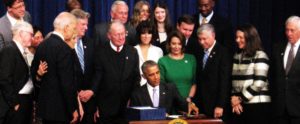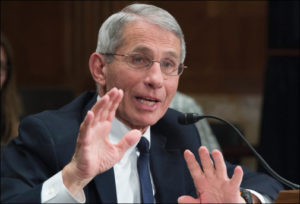Susan Jaffe | Washington Correspondent for The Lancet | 14 December 2016
The 21st Century Cures Act that President Barack Obama signed into law this week dedicates – but doesn![]() ‘t guarantee – billions of dollars to accelerating the discovery of new drugs and medical devices and getting them to patents more quickly, as well as supporting opioid addiction treatment and reforms in mental health care.
‘t guarantee – billions of dollars to accelerating the discovery of new drugs and medical devices and getting them to patents more quickly, as well as supporting opioid addiction treatment and reforms in mental health care.

President Barack Obama signs the 21st Century Cures Act, Tuesday, Dec. 13, 2016. (Photo by Susan Jaffe)
The overwhelming support for the law marks a stark contrast from the Affordable Care Act, another landmark health reform bill Obama signed in the second year of his presidency. Republicans promise to repeal it as soon as the new Congress convenes next month and Donald Trump is sworn in as president. But before the promised elimination of the ACA, Congress took nearly $5 billion from its Prevention and Public Health Fund to pay for most of the law.[Continued here.]
…


 The US Congress has become famous for political gridlock but s
The US Congress has become famous for political gridlock but s offers the best chance we have to save the one planet we have,” Obama said. “We’ve shown that the world has both the will and the ability to take on this challenge.”
offers the best chance we have to save the one planet we have,” Obama said. “We’ve shown that the world has both the will and the ability to take on this challenge.”